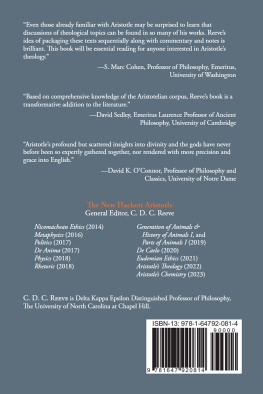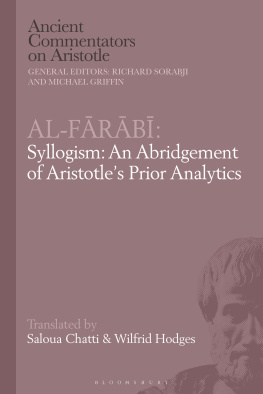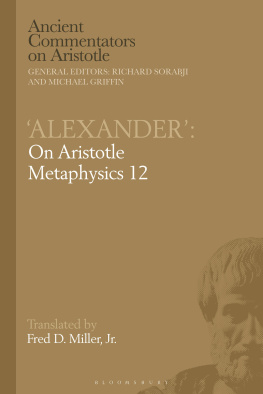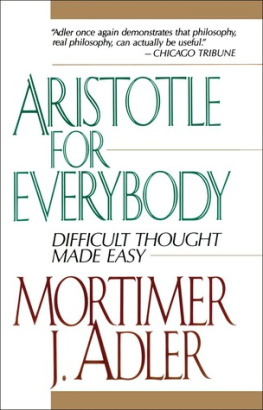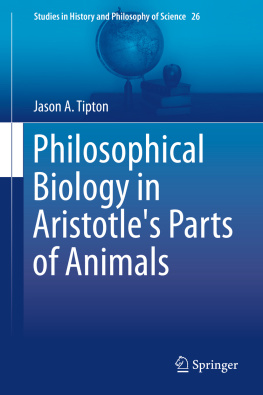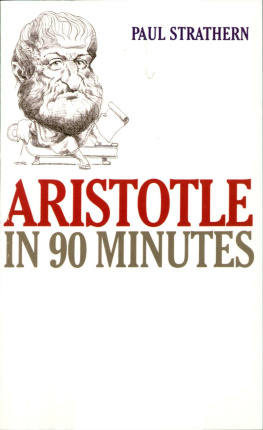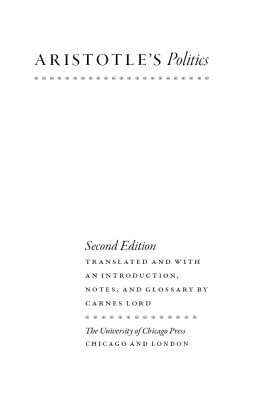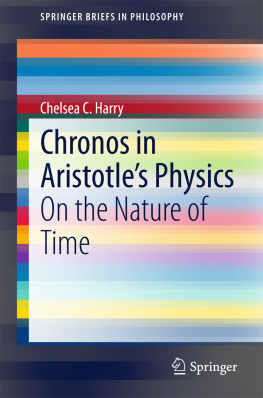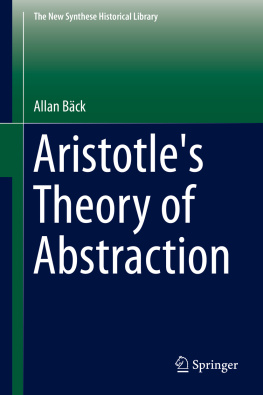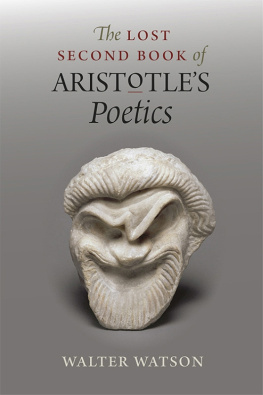
Alexander of Aphrodisias
On Aristotle Topics 2
Ancient Commentators on Aristotle
GENERAL EDITORS: Richard Sorabji, Honorary Fellow, Wolfson College, University of Oxford, and Emeritus Professor, Kings College London, UK; and Michael Griffin, Assistant Professor, Departments of Philosophy and Classics, University of British Columbia, Canada.
This prestigious series translates the extant ancient Greek philosophical commentaries on Aristotle. Written mostly between 200 and 600 AD, the works represent the classroom teaching of the Aristotelian and Neoplatonic schools in a crucial period during which pagan and Christian thought were reacting to each other. The translation in each volume is accompanied by an introduction, comprehensive commentary notes, bibliography, glossary of translated terms and a subject index. Making these key philosophical works accessible to the modern scholar, this series fills an important gap in the history of European thought.
A webpage for the Ancient Commentators Project is maintained at ancientcommentators.org.uk and readers are encouraged to consult the site for details about the series as well as for addenda and corrigenda to published volumes.

Contents
| [] | Square brackets enclose words or phrases that have been added to the translation for purposes of clarity. |
| <> | Angle brackets enclose conjectures relating to the Greek text, i.e. additions to the transmitted text deriving from parallel sources and editorial conjecture, and transposition of words or phrases. Accompanying notes provide further details. |
| () | Round brackets, besides being used for ordinary parentheses, contain transliterated Greek words. |
| Adv. Math. | Adversus Mathematicos |
| An. Post. | Analytica Posteriora |
| An. Pr. | Analytica Priora |
| Ath. Resp. | Atheniensium Respublica |
| Cael. | de Caelo |
| CAG | Commentaria in Aristotelem Graeca, 23 vols (Berlin: Reimer, 18821909) |
| Cat. | Categoriae |
| Crat. | Cratylus |
| DA | de Anima |
| De Top. Diff. | de Topicis Differentiis |
| EN | Ethica Nicomachea |
| Gorg. | Gorgias |
| Hist. | Historiae |
| Hp. Ma. | Hippias Major |
| Insom. | de Insomniis |
| Inst. Log. | Institutio Logica |
| Int. | de Interpretatione |
| LSJ | H.G. Liddell, R. Scott, and H. Jones, A Greek-English Lexicon (Oxford: Clarendon Press, 1996) |
| Metaph. | Metaphysica |
| PA | de Partibus Animalium |
| Parm. | Parmenides |
| Phaedr. | Phaedrus |
| Phys. | Physica |
| Prot. | Protagoras |
| Pyrr. Hyp. | Pyrrhonei Hypotyposes |
| Resp. | Res Publica |
| Rhet. | Rhetorica |
| SE | de Sophisticis Elenchis |
| Sol. | Solon |
| SVF | von Arnim, Stoicorum Veterum Fragmenta, 4 vols (Leipzig: Teubner, 190324) |
| Top. | Topica |
reputable and are therefore suitable premises for dialectical arguments; how the questioner and the answerer are supposed to fulfill their respective tasks successfully, etc. Top. 27 are more technical in character in that they provide lists of topoi, i.e. argumentative patterns and strategies that can be used in order to find the appropriate (type of) premises for a given (type of) conclusion.
Two correlated aspects are particularly puzzling for the contemporary interpreters of Aristotles Topics. Firstly, in Top. 1.1, 100a257 Aristotle provides an account of sullogismos (deduction or deductive argument or more technically syllogism) fall. Furthermore, from the lists of topoi in Top. 27 and other passages (e.g. Top. 7.5, 155a378) we gather that topoi are something we can use in order to find the appropriate premises for a given conclusion, i.e. that topoi have some sort of heuristic function. However, these pieces of evidence leave a number of questions open: is a topos merely a heuristic device or does it play a structural role in the construction of an argument? If so, are topoi supposed to be anything like schemes or general premises of deductive arguments? And what is the relation (if any) between topoi and the theory of syllogism developed in the Analytics?
For most modern interpreters the difficulties about the relations between Topics and Analytics are not necessarily supposed to be solved within a unified account in which both the syllogistic theory of the Analytics and the topical approach to deductive arguments of the Topics find a well-defined place. Rather, difficulties are often bypassed by resorting to assumptions about the chronological order in which Aristotles writings were composed and the different stages in the development of Aristotles philosophical views they reflect. In the case of Topics and Analytics, the main idea is that the Topics (Aristotles treatise on dialectical sullogismoi stemming from the codification of the Academic practice of dialogical argumentative exercises) but, despite important attempts at bringing the Topics and Analytics closer to each other, whether and how the views about deductive arguments in these writings can be fully reconciled remains, even in the best scenarios, a matter of controversy. More generally, awareness of the complex story of the assemblage of the Aristotelian corpus is an irreversible achievement of modern Aristotelian scholarship. Even if the extreme developmentalism of Jaeger and his pupils has been superseded, it is unavoidable (and rightly so) for the modern scholar to use some caution in reconstructing Aristotles systematic views across different parts of his writings.
In this respect, Alexanders approach to the relation between Topics and Analytics and his corresponding analysis of the sample arguments in the Topics reflect a distinctive and rather different perspective. For the idea of resorting to the philosophical development of the author as a way to explain away more or less evident divergences in Aristotles writings is pretty much foreign to Alexander (as well as to late antique and medieval commentators more generally). Alexander is in a way forced to develop a compatibilist reading of Topics and Analytics as parts of a unified system of Peripatetic logic. For this reason, Alexanders approach is valuable both as a piece of exegesis and as a piece of history and philosophy of logic. The reasons why Alexander can endorse a compatibilist approach to Topics and Analytics are for the most part not (or, at least, not without qualification) viable options for the contemporary reader of Aristotles works since for Alexander the developments of Peripatetic logic after Aristotle, especially those due to his immediate followers and contemporaries Theophrastus and Eudemus, are complementary and, in some cases, even explanatory of what Aristotle never did but meant to do. For example, Alexander relies without hesitation on a (post-Aristotelian) theory of so-called hypothetical syllogisms in order to explain how some topical arguments work. This sort of assumption about the existence of a system of Peripatetic logic which somehow remained faithful to Aristotles alleged intentions and can therefore be brought in in order to read Aristotles text is, from the point of view of modern scholarship, highly questionable. However, the general picture of how Peripatetic philosophy as a whole can encompass a system of logic, of which both
Next page


